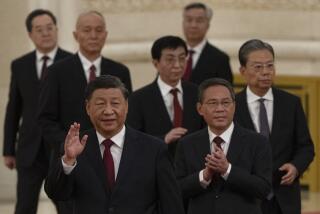Communism Still Goal in China, Deng Asserts : Apparently Trying to Quiet Critics of Economic Reforms, He Warns Against ‘Capitalist Ideals’
- Share via
PEKING — Chinese leader Deng Xiaoping, apparently seeking to quiet leftist opposition to his economic reforms, said in a speech published Saturday that the ultimate aim of China’s modernization and economic reform program is to achieve communism.
“We should not allow young people to become captives of capitalist ideologies or ideals,” Deng said. “ . . . We must let our people, including our children, know that we are sticking to socialism and communism.”
Although Peking permits foreign corporations to invest in China and tolerates a certain amount of Chinese-run private enterprise, Deng said, “public ownership will always be the predominant force in (China’s) socialist economy.”
Backlash Against Reforms
His remarks appeared to be aimed at stemming a growing backlash against his economic reform program by hard-line members of the Communist Party.
The package of reforms approved by the party’s Central Committee last October calls for greater use of wage and profit incentives, more tolerance of small-scale private enterprise, a reduced role for central planning and greater reliance on market forces to determine prices.
The reforms are aimed at stimulating production and increasing efficiency. But party officials increasingly have complained that they open the way for a materialistic consumer society in which wealth is the sign of success.
Last month, Politburo member Hu Qiaomu, in a speech to army and party officials in Fujian province, assailed “excessive” publicity in Chinese news media about families that have become wealthy.
“We should overcome the unhealthy tendency among some people of putting money above all else or even judging a person’s social status by his income,” Hu said.
Not Abandoning Tradition
Deng’s speech amounted to a strong reaffirmation that, in pursuing the new reform program, China’s leadership is not abandoning the Communist Party’s traditional goals and ideals.
He spoke Thursday at the closing ceremony of a national science work conference here. As is customary in China, the conference and speech were off-limits to foreign correspondents, and they were not immediately reported in the Chinese media. On Saturday, the party newspaper People’s Daily published a long account of Deng’s speech on its front page.
Deng said the goal of his program and of socialism itself is to achieve common prosperity. Therefore, he said, those individuals and those sections of China that become wealthy first are supposed to help the rest of the nation.
If the reforms lead to polarization between rich and poor, or between wealthy coastal areas and impoverished inland regions, he said, then the program will fail.
“Should a new bourgeois class appear, that would mean that we have walked on the wrong path,” Deng told the conference.
The Chinese leader acknowledged that some people in China are worried that the country will “turn capitalist” and said these fears are understandable.
“We should help people to get rid of these worries with facts not just empty words,” Deng said, adding that China will respond “to those who hope China will turn capitalist.”
China’s aims remain the same, he said. “All the policies we have tried out in different ways are for developing socialism and for realizing communism in the future.”
Communism Final Stage
In the traditional Marxist view, socialism is seem as an intermediary stage between capitalism and communism, the final stage of development in which a classless society is achieved and the state withers away.
Last fall, Su Shaozhi, director of China’s Institute of Marxism, Socialism and Mao Tse-tung Thought, told reporters that it may be centuries before China advances from socialism to communism.
There was no indication in Deng’s speech that he and his aides will abandon the economic reform. On the contrary, they are reported to be working on plans for worker wage increases later this year to offset the price increases expected from the transition to a more market-oriented economy.
Deng’s allies and old-line Communist Party members unhappy with his reform program have all been maneuvering for position in preparation for a major party conference to be held here in September. Deng’s reaffirmation of Communist ideals could help him retain the initiative by gaining support within the party for leaders who support the economic reforms.
More to Read
Sign up for Essential California
The most important California stories and recommendations in your inbox every morning.
You may occasionally receive promotional content from the Los Angeles Times.










